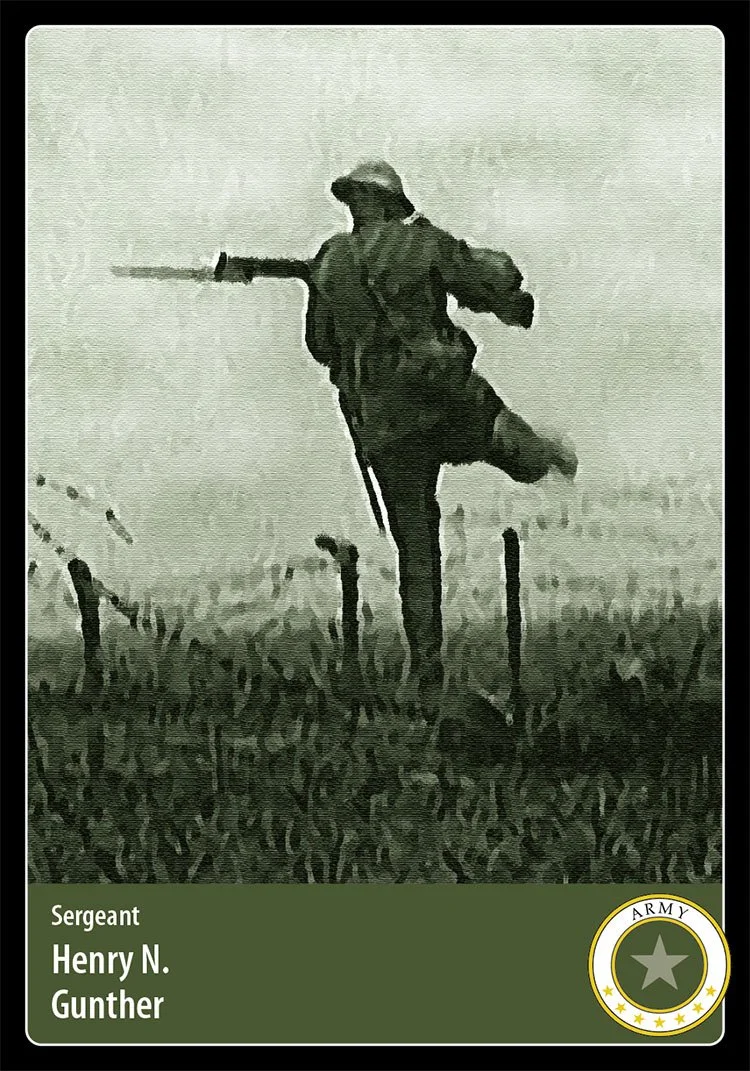Hero Card 110, Card Pack 10
Artist’s impression by Craig Du Mez
Hometown: Baltimore, MD
Branch: U.S. Army
Unit: Company A, 157th Brigade, 79th Infantry Division, 313th Infantry Regiment
Military Honors: Distinguished Service Cross, Purple Heart
Date of Sacrifice: November 11, 1918 - KIA near Chaumont-devant-Damvillers, Meuse, France
Age: 23
Conflict: World War I, 1914-1918
Henry Nicholas John Gunther’s grandparents emigrated from Germany in the mid-1800s, starting new lives in Baltimore, Maryland. Henry was born on June 6, 1895. He attended public schools in East Baltimore, and his family worshiped at Sacred Heart of Jesus Catholic Church, on Conkling Street.
As World War I (1914-1918) raged in Europe, many Americans of German heritage came under suspicion about their loyalty to the United States. In Gunther’s largely German-American East Baltimore neighborhood, it would be dangerous to voice opposition to the war in Europe.
When Henry Gunther was drafted into service in September 1917, he was working as a clerk and bookkeeper for the National Bank of Baltimore and was engaged to be married. While he was less than eager to leave for the battle trenches of Europe, Henry shipped out with the 313th Infantry Regiment in July of 1918.
By that time, the war was clearly entering its final act. Most knew that America’s participation would bring a decisive end to the conflict. Much to his relief, the Army put Pvt. Gunther’s organizational and accounting skills to use, with an assignment as the supply sergeant for A-Company. He performed his duties well and was promoted to the rank of Sergeant.
Everything changed for Sgt. Gunther when he wrote a letter home to a friend, describing the horrors of the trenches and advising him to avoid frontline service if possible. The letter was intercepted by an Army postal censor and forwarded to Gunther’s commanding officer.
When the United States officially declared war on Germany in April 1917, the government was on high alert for any signs of disloyalty from its large population of German-American citizens. Two months after entering the war, Congress passed the Espionage Act, making it a crime for any citizen to pass information that would hinder U.S. armed forces’ prosecution of the war, or for any person to promote the success of America’s enemies.
In a message to Congress, President Woodrow Wilson warned that the war would require a redefinition of national loyalty because of “millions of men and women of German birth and native sympathy who live amongst us.” He openly stated, “If there should be disloyalty, it will be dealt with a firm hand of repression.”
Sgt. Henry Gunther was busted all the way down to Private, removed from his logistics/supply duties, and sent to the front lines as a rifleman. His demotion came just as the 313th Regiment began two months of continuous combat.
Up until the last day of the war, Gunther survived the bloody Meuse-Argonne Offensive (September 26-November 11), the final Allied offensive of World War I that involved more than a million American soldiers.
Just after 5:00 a.m. on November 11, 1918, British, French, and German negotiators signed an armistice to end the war. Under the agreement, all hostilities would cease at precisely 11:00 a.m. on that day. The six hours were intended to allow time for news of the war’s end to reach remote battlefields.
Word of the war’s end reached the 313th Regiment when a runner arrived at 10:44 a.m. Gunther’s brigade commander, Brigadier General William Nicholson, told his troops that there would be “absolutely no let-up” until precisely 11:00 a.m.
Another American drafted into military service was a young journalist, James M. Cain, who would later achieve fame as a famous author (The Postman Always Rings Twice and Double Indemnity). Cain was a message runner in the Meuse-Argonne Offensive and wrote an account—excerpted here—of Pvt. Gunther’s actions in the final moments of “the war to end all wars”:
According to his companions, Gunther brooded a great deal over his reduction in rank, and became obsessed with a determination to make good before his officers and fellow-soldiers. Particularly he was worried because he thought himself suspected of being a German sympathizer.
He acquitted himself splendidly in the Montfaucon fight, and on the drive east of the Meuse he was selected to act as a company runner—particularly dangerous work, for a runner is the bearer of important messages, and must get them delivered, even if his way lies over the most exposed country.
On November 11 he was still on duty as a runner. His company had been ordered to advance on Ville-Devant-Chaumont, in the extreme right of the Seventy-ninth’s sector, and several parties were already in the town. Gunther, with one or two other runners and an advanced party of riflemen from his company, was just on the outskirts. The order had already come that hostilities were to cease at 11 o’clock.
Directly ahead there was visible a German machine gun nest. Gunther, according to the men of Company A, must still have been fired by a desire to demonstrate, even at the last minute, that he was courageous and all-American. At a few minutes to 11 he announced that he was going to take that machine gun nest, and though his companions remonstrated, and told him that in a few minutes the “war would be over,” he started out, armed with a Browning automatic rifle.
When the Germans saw him coming they waved at him and called out, in such broken English as they could, to go back, that the war was over. He paid no heed to them, however, and kept on firing a shot or two from his automatic as he went. After several vain efforts to make him turn back, the Germans turned their machine gun on him, and at one minute of 11 o’clock Gunther fell dead.
The guns stopped firing at 11 o’clock—a few seconds after—and a few minutes after the German machine gun crew that had killed him came out with a stretcher and placed Gunther on it. They then carried him back to his party from Company A he had left but a short time before. They explained that they had tried to keep him from coming on, and that they had to shoot him in self-defense. They insisted on shaking hands with the Americans, after which they set Gunther down and returned to their own lines.
At 10:59 a.m. on November 11, 1918—at the age of 23—Pvt. Henry Gunther was killed one minute before guns went silent on the Western Front, marking the official end of hostilities.
There is no way to know Gunther’s thoughts as he ran toward the German machine guns. He may have been proving his loyalty by following Gen. Nicholson’s “no let-up” order to the letter. He may have sought to erase all doubts and prove his allegiance to the American side. He may have suffered a mental breakdown from all that he’d seen during two months of intense trench warfare. Or perhaps word hadn’t actually reached him that the war was over.
If his motivation was to restore his reputation, the fatal tactic worked. In his “Order of the Day,” General John Pershing—responsible for all American Expeditionary Forces—officially recognized Henry N. Gunther as the last man killed in World War I. The Army posthumously restored Gunther to the rank of Sergeant and awarded him the Distinguished Service Cross.
Listen to the Grateful Nation Project recording of SGT Gunther’s story on Our American Stories podcast >
Sources
Card Art: Artist’s impressin by Craig Du Mez
HistoryNet.com: He Covered The Last Death Of WWI. His Words Launched His Career
History Channel: The Last Official Death of WWI Was a Man Who Sought Redemption
The German Society of Maryland: The SGT. Henry Gunther 100th Anniversary Commemoration
Joseph E. Persico: Eleventh Month, Eleventh Day, Eleventh Hour (p. 351)
The Baltimore Sun: The sad, senseless end of Henry Gunther
TIME Magazine: The Mysterious Story of the Last American Soldier to Die in World War I
Newspapers.com: Last American Death of WWI
Veterans Breakfast Club Magazine: The Last Man to Die in World War I
Burial Site: Find a Grave





